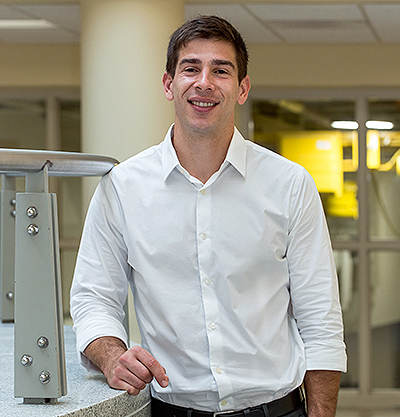Boston College physicist receives Serbia's Marko Jarić Award
Professor of Physics Ilija Zeljkovic has been honored in his native Serbia with the Marko Jarić Award, sometimes referred to as the “Serbian Nobel for Physics,” for his research into novel materials.

Ilija Zeljkovic (Lee Pellegrini)
Zeljkovic received the award from the Marko V. Jarić Foundation, in collaboration with the Serbian Institute of Physics, at a March 14 ceremony at the Serbian Academy of Sciences and Arts in Belgrade. Awarded for the past 25 years, the prize honors native Serbian scientists in honor of the late physicist.
The jury citation recognized Zeljkovic “for outstanding contributions to the study of highly correlated superconducting materials based on cuprates and crystal topological insulators, as well as to the study of superconductors with the Kagome crystal lattice.”
Following the formal award ceremony, Zeljkovic delivered remarks to a public audience and discussed his research with his peers at the Institute for Physics in Belgrade.
Zeljkovic, who came to Boston College as a postdoctoral researcher, joined the faculty in 2015, and was named a full professor last year, said the award holds a special significance.
“I am honored to receive the Marko Jarić Award. In some ways, this award completes a full circle in my professional life. I left Serbia after high school, as a student who aspired to become a scientist. Twenty years later, I am recognized for my accomplishments as a physicist in my native country. I am happy to see that my research ‘crossed’ borders and has been noticed by my colleagues in Serbia.”
The Serbian community of condensed matter physicists and scientists in the United States is close knit, Zeljkovic said, and even younger scientists are aware of Jarić’s work, conducted at Texas A&M University, where he was a tenured professor.
“Although his career was cut short by illness, Professor Jarić made a number of impactful scientific contributions,” Zeljkovic said. “The award I received was created more than 25 years ago in memory of his accomplishments, and also to recognize accomplishments of physicists in Serbia and physicists of Serbian descent abroad. Although it can be given for all areas of physics, my experimental research direction in condensed matter physics is coincidentally closely aligned with some of the topics Professor Jarić explored theoretically.”
After graduating from the Mathematics High School in Belgrade, Zeljkovic earned a bachelor’s degree at Washington University in St. Louis and a doctorate at Harvard University. His research into new frontiers in materials science has been published in leading peer-reviewed journals, including Science and Nature.
The Zeljkovic Lab at BC explores the synthesis of new materials and research using scanning tunneling microscopy. A particular focus are cuprate-based superconductors, iron-based superconductors, and superconductors with the Kagome crystal structure.
Zeljkovic said his research could not have advanced without the support of the University and his colleagues in the Department of Physics. His work has been supported by several leading U.S. agencies, including the Department of Energy, National Science Foundation, Army Research Office, and Defense Advanced Research Projects Agency.
“The startup funds from BC enabled purchasing state-of-the-art instruments and performing our first experiments in the lab,” said Zeljkovic. “Grants from the DOE, NSF, ARO, and DARPA provided immense additional opportunities for new projects—purchasing new equipment, acquiring materials, and providing student support. Much of the work we performed in the past nine years here would not have been possible without the support of BC and these federal agencies.”
